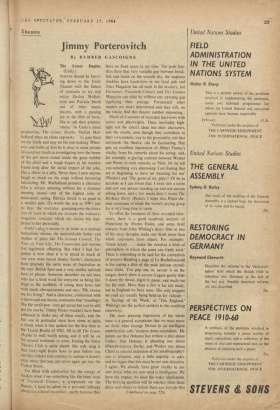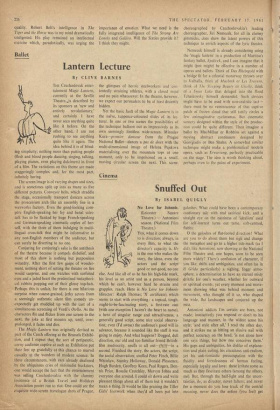Evil is present in Mason Flagg, a rich, thickly handsome
reject of Groton and Princeton, who has set up riotous court in a gaudy villa over- looking the Tyrrhenian near Amalfi. He is an absurd, even pathetic figure, with his private- school slang and Casanova pretensions (he is always trying to jolly friends and clients into 'circuses'—mixed bedroom tournaments of narcotised joylessness). In spite of his bombast about humanist experiment and the gospel of Sade, it is hard to credit him with raping the maid Francesca, beating her to death and hurling himself from a precipice. But a darker side of his character reveals itself in his relation with the drunken painter, Cass Kinsolving. Cass is a type of goaded American innocence, trailing about the Continent with his docile wife and cluster of small children in a perpetual chaos of debt, soiled nappies and scratchy old Mozart records. He tortures himself for his failure with an intensity which rouses an answering, jealous cruelty in Mason, and it takes murder to unravel for Cass the tangle of guilts which lures both men into an ambivalent bond of slave and, master, eater and eaten. The novel is too crammed with matter to succeed wholly, but such rich congestion cannot wholly fail. Oddly, Mr. Styron's main short- coming is in establishing the relationship on which the book hinges: he builds up elaborately his complementary portraits, but never con- vincingly shows the interaction whose necessity he works with such detail to prove. Instead, the novel flowers out from its centre in brilliant but gratuitous scenes and minor characters. Still, its extravagance is a hemorrhage of real, red pro- tein. You come away gorged as by porterhouse after a pastry diet. What to say? Mr. Styron is the member of his generation to watch. That sombre, torrential imagination once channelled, he may turn out the new Fitzgirald, or the new Faulkner.
Kathleen Sully is another mystery, which on the evidence of her new novel I can't solve. Subtler colleagues than I recoiled baffled before the sibyllic ironies of her earlier products, Skrine and Shade of Eden. After such report, the puzzle of The Undesired is its almost flat sim- , plicity. Two retired solitaries, a horty spinster and grey civil servant, come to a Cornish village by the sea. They become involved in the local gossip, trivialities and each other, but when Miss Strathers gruffly suggests marriage, Mr. Chubb clings to his daydream about the village beauty, and says no. That is almost all there is to it, except for a growing granite touch to the mild, spare story. As the detail gets less and less, the oddities of the elderly protagonists more gnarled, the omissions seem slightly ominous. It is almost as if Ivy Compton-Burnett had escaped for a middle-class seaside holiday.
I can't think why Patricia Highsmith took so long to rescue from the ranks of thriller-writers. Admittedly she writes novels about murders in- vestigated by the police, and presents them as problems to be cracked with the satisfying neat- ness of an axe splitting open a log. But the logs on which she turns her hatchet with such chilling precision are, as readers of Deep Water and The The Absence of a Cello is in fact a routine three-act Broadway farce, slyly camouflaged with a turn or two round the block : the old one about the egghead family circle too crazy.:wise to be squared by Big Business. I preferred it when it was You Can't Take It With You, and found the modish digs at grey-flannel togetherness staling rather than-otherwise. Still, worth sitting through for a few of the lines: 'Is Madam,' inquires the saleslady asked for a slinky dress, 'on the make?'
RONALD BRYDEN
A Share in Revolutions
Man of Reason: The Life of Thomas Paine. By
Alfred Owen Aldridge. (Cresset Press, 25s.) Tom PAINE. is the apotheosis of a doctrinaire radicalism which is out of tune with the whole tenor of contemporary political thinking. He stands at the beginning of a line of descent the intellectual pretensions of which Popper, Oake- shott, Isaiah Berlin and Talmon have ruthlessly demolished. Paine's great debate with Burke—the debate between the defender and the enemy of the French Revolution, between the believer in natural rights and the believer in prescription and precedent—has gone on ever since 1791; but, in the climate of modern opinion, Burke has won hands down. The argument, a modern historian has declared, 'has been decided in favour of Burke as clearly as the debate over the relation between the motions of sun and earth has been decided in favour of Copernicus.'
How refreshing, therefore, that at last an able writer has come to the rescue of this exploded volcano. For no one can deny that, in his day. Paine's influence was volcanic; As Professor. Aldridge says, Paine's contribution to the pro- paganda of the American Revolution equalled that of Franklin to its diplomacy and of Washington to its military strategy; his ideas nurtured revolutions in three continents—North America, Europe, South America. Or would it be a better analogy to compare him with a comet? Certainly, his practical influence was extraordinarily short-lived. Before he left for America in 1774 at the age of'thirty-seven, fiis life was one of total mediocrity; after he returned from France in 1802, he was cold-shouldered, and he died in obscurity. 'His own writings are his best life,' wrote Joel Barlow in 1809, 'and these are not read at present.' The statement re- mains true today. And yet in the interval he was 'one of the most influential intellectual forces in three countries.' This is the paradox of his life and to explain it is the challenge to his bio- grapher. It is a challenge which Professor Aldridge has successfully taken up; his book avoids the fireworks of popular biography, but it is convincing, sensible and highly readable.
Paine himself, with characteristic vanity, said that 'he was at a loss to know whether he was made for the times or the times made for him.'



































 Previous page
Previous page